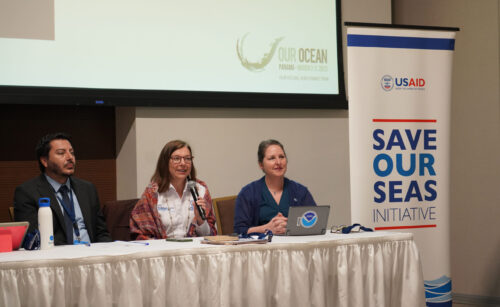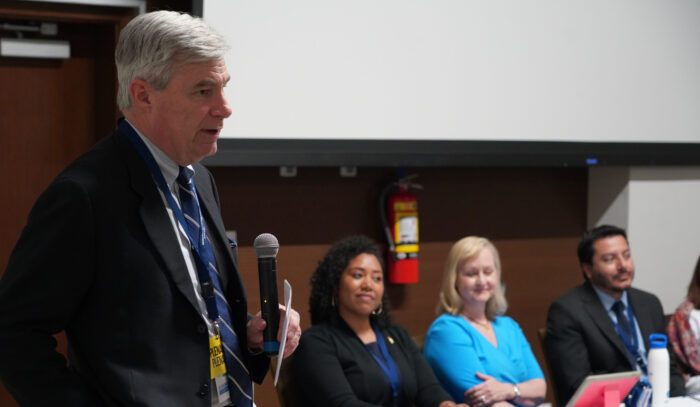USAID Spotlights Cities at Our Ocean Conference

March 2, 2023 – Around the world, waste management is the responsibility of local governments. Few local government services are as visible in our daily lives—and important—as waste management. Yet many local governments lack the institutional capacity and resources necessary to successfully plan, build, and operate the on-the-ground waste management services that prevent ocean plastic pollution. These services require strong local institutions that are empowered and capable of implementing national regulations and plans; demonstrate leadership and transparency in planning and implementing waste programs; and value the importance of proper waste management for overall community health and well being.
As global leaders convened in Panama for the Our Ocean Conference—now in its eighth year— to deliberate the state of our oceans and reaffirm commitments to address marine pollution, the United States Agency for International Development (USAID), through its Clean Cities, Blue Ocean program, co-hosted a side meeting to spotlight the role of local governments in managing their waste streams and preventing that waste from entering the ocean.
USAID together with Urban Ocean®—a partnership between Ocean Conservancy, The Circulate Initiative, and the Resilient Cities Network—co-hosted the side event to emphasize the importance of cities as frontline defenders of marine pollution and to announce several tools and initiatives that are available to help local governments reduce the waste entering our waters.

At the event, Nicole R. LeBoeuf, Assistant Administrator for the National Oceanic and Atmospheric Administration welcomed participants and U.S. Senator Sheldon Whitehouse from Rhode Island delivered opening remarks. A panel discussion followed that included representatives from USAID, Ministry of Peru, The Circulate Initiative, Ocean Conservancy, and Panama City. Albina Ruiz, Peru’s Minister of Environment, closed the event.
USAID announced two new tools, developed to support cities to advance local circular economies, with Peru’s Ministry of Environment sharing their experiences implementing the resources. The first tool is USAID’s Clean Cities, Blue Ocean’s Virtual Training Hub, a free online, publicly available platform that hosts a range of trainings, webinars, and online resources to help cities tackle plastic pollution. Users can access on-demand or live events in topics ranging from managing open dumpsites, ensuring health and safety in waste management, siting and designing sanitary landfills, and planning to advance circular economies, among others. Since its launch, the hub has reached over 1,200 individuals from nearly 60 countries.
Another tool is the USAID-developed Solid Waste Capacity Index for Local Governments, also known as “SKILL.” The SCIL is a comprehensive, easily digestible tool that enables local governments to self-assess their strengths and weaknesses with respect to waste management. The assessment process, which is basically a series of “yes” or “no” questions, and backed up with verifiable data, results in a set of scores that are used to develop a feasible and actionable plan to improve key areas of a cities’ solid waste management system. One of a number of USAID technical support tools, the SCIL has been piloted in four languages in more than 17 cities across seven countries; with larger cities working with their sub-districts to conduct further SCIL assessments. Use this link to access the tool.
At the event, Urban Ocean partners shared the resource guide, the Urban Ocean Toolkit, which supports city-led solutions to the ocean plastic problem that can be easily deployed and replicated, and announced a $2.5 million commitment from American Express to advance climate solutions and reduce ocean plastic pollution.
At the conference, USAID announced $40.5 million, subject to the availability of funds and Congressional notifications, to initiate and expand on country programs to combat ocean plastic pollution and other marine debris at the local level. This includes the Save Our Seas Initiative, which will create and expand on programs in 12 key countries and regions to address ocean plastic pollution and other marine debris at the local level that collectively generate more than 40 percent of the global total of mismanaged plastic waste. Of the total $40.5 million, $10 million is programmed through Clean Cities, Blue Ocean, USAID’s global flagship program to respond to the crisis of ocean plastic pollution under the Save Our Seas Initiative. Clean Cities, Blue Ocean works in 25 cities across 10 countries to test, scale, and share innovative, and proven solid waste management solutions with governments, communities, and businesses. These efforts will contribute to the USG goal to eliminate plastic leakage into the environment by 2040.

